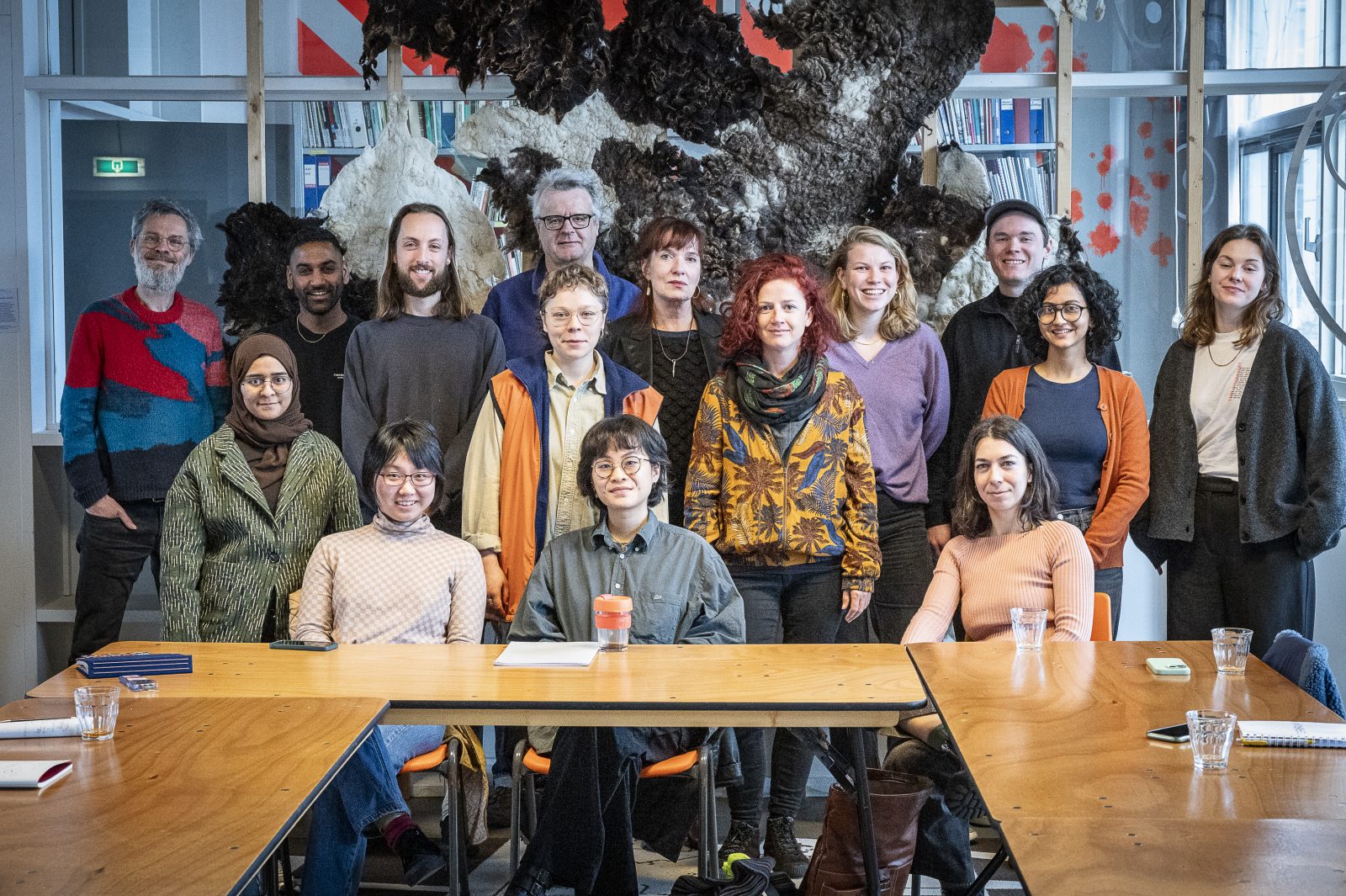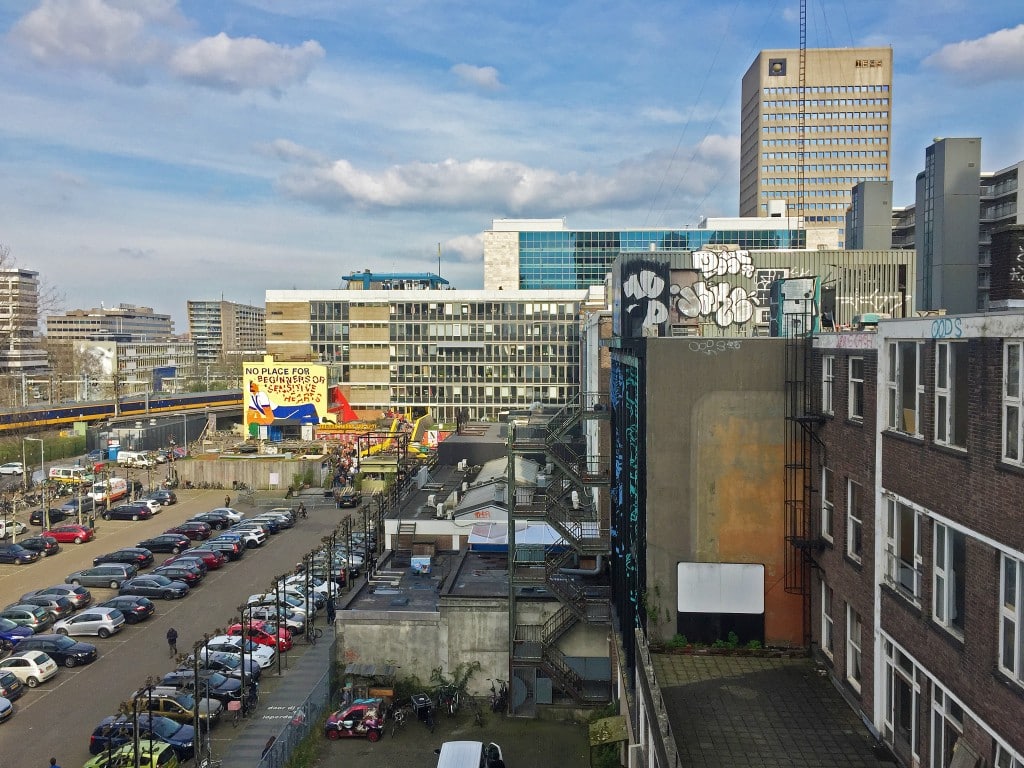This is Tomorrow
A unique 12-week education programme on contemporary urbanism, dealing with the Anthropocene, Superdiversity and Right to the City. 01 April - 21 June 2024.

This is Tomorrow is the centrepiece of our yearly education program. In a three-month course Rotterdam will be used as laboratory for research into issues that are relevant to cities all over the world. By alternately looking closely at local urban phenomena, and then zooming out to global tendencies we will see how the future is already here, at our feet and in front of our eyes.
Street culture and global warming; food production and cultural superdiversity, financialization of housing and alternative energy sources, are all combined in our study of Rotterdam.
The first two weeks will be dedicated to an introduction of Rotterdam itself, its lively urban culture, the morphology of its urban structure, its economy and its place in the global economy. The weeks after, we will work together with the Loom - Practice for cultural transformation. With Loom we will explore the ways in which city dwellers can contribute to shaping their urban surroundings in this day and age, by means of self-organisation, collaborative practices, and unexpected alliances. Afterwards we will delve into the effects and new realities of the Anthropocene in which we all live. With landscape architect Dirk Sijmons and exhibition designer Herman Kossmann we will explore the many effects on daily urban life when the global temperature has risen by 2,5 degrees, which is expected in roughly 50 years. The focus of this studio is not just research or its visualization, but also the making of a catalogue of ways of survival for future urbanites. The results will be shown at the International Architecture Biennale of Rotterdam in 2024.
The fourth section will take the public spaces of Rotterdam as its focus, the streets, squares and much more. With specialist in the sociology of public space Linda Zuijderwijk, Crimson, photographer Florian Braakman, the Nite shop, and others, we will learn and develop ways of interviewing people, notating places, interpreting what we see and retelling it in pictures, maps and stories. The central question is how the ongoing diversification of Rotterdam’s population has affected the way we use and see our spaces. Should we design and maintain them differently? How can we make the city fit its people, and not just the other way round? This section will result in a report and a one-day exhibition.
Every block will be wrapped up by making a concrete individual product, either a textual column, graphic novel, design or another type of visualisation. In the last week, we will collectively synthesise our production.
COURSE PROGRAMME
WK 1 & 2 / 01 April - 12 April 2024
INTRODUCTION: LEARNING FROM ROTTERDAM
The first two weeks will be dedicated to an introduction of Rotterdam itself, its lively urban culture, the morphology of its urban structure, its strategies and challenges for housing, for alternative energy sources, and its place in the global economy. Through field trips, lectures and exercises, you will explore the physical but also the invisible realities of the urban landscape while meeting professionals from within the network of the School, whose diverse backgrounds, work, experience and opinions will sharpen your own thinking. In these first weeks you will be learning from Rotterdam while critically reflecting on the trends and developments that influence the city.
WK 3 - 5 / 15 April - 03 May 2024
THEMATIC BLOCK #1 - RIGHT TO THE CITY
In this three-week workshop with Loom: practice for cultural transformation, we will explore to what extent city dwellers can contribute to shape their urban surroundings in this day and age. In the 'smooth city', the polished, optimised and neatly finished city that is becoming increasingly dominant worldwide, there hardly seems to be any room for residents' own interventions, but is this really the case?
In this workshop we will collectively unravel and bring together examples of initiatives and collaborative practices that foster fabrics of responsibility. Participants will be invited to research, document and create new “Looking After The City” tactics and modes of collective action for a particular place or area. From spontaneous improvisation, to queering urban space, inventing new forms of commoning or by enforcing alternative urban practices. The workshop also explores how the use of urban space for one person might clash with the needs for another, and how the idea of “the right to the city” might be transformed from an individual right to a collective responsibility and forms of urban care. How do we continue to look after the city and its (more-than-human) dwellers?
WK 6 - 8 / 06 May – 24 May 2024
THEMATIC BLOCK #2 - ANTHROPOCENE: THE +2,5 DEGREE CITY
During this thematic block, we’ll dive into the Anthropocene – the geological era marking the dominant human impact on the Earth systems. Just as many cities around the world, Rotterdam has the ambition to become green, sustainable and resilient. All around the city we see projects being developed to transform this car-dominated city, into an attractive and green environment for all its inhabitants, while simultaneously aiming to increase awareness about climate change and sea-level rise. But is it enough?
In these three weeks we will map out the predicted effects of a 2,5°C temperature rise on the Netherlands, on the City of Rotterdam and on a number of very specific places in the city. After exploring these effects, we will then use our collective knowledge and that of our guest speakers and scientific literature, to imagine how we can mitigate the negative effects of global climate change and what is needed to make life livable in a city that suffers its consequences.
WK 9 - 11 / 27 May – 14 June 2024
THEMATIC BLOCK #3 - SUPERDIVERSITY
Because of the port and its connection with the rest of the globe, Rotterdam has always attracted people from all over the world. Nowadays over 170 different nationalities call the city their home. The population has become so diverse that Rotterdam has become part of a worldwide family of Majority-Minority cities – meaning that more than half of the population has a migration background. And, not just the number of nationalities has increased: as generations pass, also the diversity within the different migrant groups has become increasingly complex and as anthropologists call it: Superdiverse.
In this the third block we will be working together with sociologist Linda Zuijderwijk, Crimson, photographer Florian Braakman, the Nite shop and others. You will learn and develop methods for interviewing people, to record locations and conversations, to interpret what we see and to retell it in pictures, maps and stories, with the aim to get a deeper understanding of the Superdiverse makeup of the population.
WK 12/ 17 June – 21 June 2024
REFLECT AND PRESENT
Time to show your work to the world! The Independent School will organise a final collective event around the opening of the exhibition and invite the leaders of the City to see what has been produced and to react to it. We’ll show Rotterdam what we’ve got and finish this intensive programme with a bang!
METHODOLOGY
The course will use the Independent School for the City’s methodological triad of Research, Stories, Strategies Action!
# RESEARCH
We believe that strategies for the city should be based on real, first-hand, empirical research. Empirical because the reality of the city offers interesting conflicts and unpredictable synergies to learn from and build upon. Through lectures by the best experts, precisely planned excursions through Rotterdam, mapping exercises and desk research, we can uncover the invisible layers of the city, look at sites through various lenses and collect the data needed to take a position vis-à-vis the city’s challenges. We look at the city as a palimpsest of different systems, ideas, infrastructures, policies and ideologies. Each time, we consider Rotterdam as a means to get a close-up view of global trends and networks.
# STORIES
To share your findings and insights on the city with others, in order to turn it into action, we need to construct a strong narrative. You can use different formats and techniques, different languages and methods with which a story can be told. From the written manifesto to the exhibition, the political campaign to the utopian plan, the movie to the historical essay. The aim to discover how a narrative approach not only carries the message we want to share but will shape and influence it too. Through the stories we tell, we start to change the reality of our cities.
# STRATEGIES
After research and a story, comes a strategy: way to change the environment, to bring your story to the widest possible audience, to influence policies with your research, to make an actual physical thing or to start a process of transformation that involves as many people as possible. What is your end goal, and which kind of process, which strategy, would you choose to reach it?
# ACTION!
The final step is to develop a concrete action. This can be a carefully written and timed manifesto be a poster campaign or a government-funded master plan; the construction of a prototype, a demonstration or a tactical policy change. An active resident group can sometimes have as much impact on the shape of a street as an iconic piece of architecture. With an action, we take the first step in developing a strategy and attempt to land our ideas in the “real world.
ABOUT ROTTERDAM
Once unknown and misunderstood, the city of Rotterdam is now more popular than ever. Iconic buildings, bars and restaurants pop up all around town, making it an attractive destination for tourists, students and other visitors from all around the world. The population is growing, house prices are on the rise and the development of new urban districts is in full swing. In less than two decades the city has changed from a harsh and grim, yet poetic, place to a smooth and attractive city that is loved and today is even called hospitable and pleasant.
But no matter how charming the city presents itself, no matter how modern or popular it is, it owes - contrarily enough – a large part of its appeal to its sharp edges; its attraction lies not exactly in being able to offer what you are looking for, but in what it confronts you with unexpectedly: the surprises, the jagged fringes and the opportunities they bring. The city is a real city because it always offers more than what you asked for. It is the darker side that makes her more than a small town. The city is old, dirty and beautiful at the same time. That’s why we love her, why we want to nurture her.
Yet, at the same time, there are still many serious issues in this city that are problematic. Just like other world cities, Rotterdam has to come to terms with social inequality and spatial segregation, with drug-related crime and human trafficking, with pollution and environmental degradation. The city has been part of a global network since her origins and shares these issues with cities worldwide such as Hong Kong or Baltimore, Athens or Accra. Her problems are not unique, but can we devise unique strategies to solve them?
